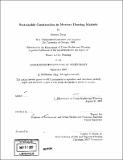Sustainable construction in Mexican housing markets
Author(s)
Jung, Bomee
DownloadFull printable version (4.465Mb)
Other Contributors
Massachusetts Institute of Technology. Dept. of Urban Studies and Planning.
Advisor
Tunny Lee.
Terms of use
Metadata
Show full item recordAbstract
This thesis examines recent developments in Mexico's housing markets as an example of how sustainable construction is being adapted and applied in developing countries. The recognition that the construction, operation, and demolition of buildings greatly impact the environment has spurred industry and government alike to examine ways to foster sustainability in the construction and property development industry. Mexico has made progress in addressing sustainability in low-cost housing through public sector-sponsored pilot programs, at a time when the developer-produced low-cost housing market is experiencing dramatic growth. I examine the state of the art of sustainable construction in Mexico and ask: What are the barriers to the wide-spread adoption of sustainable construction in housing? How have programs for energy and environmental sustainability engaged these challenges? What conditions suggest additional approaches to promote sustainable low-cost housing? Over four months in Mexico, I conducted semi-structured interviews of about thirty professionals in the development industry. The interviews suggest that consumers don't value environmental performance, but rather size and amenities; sustainable construction costs more to build, and this cost premium must be passed on to the consumer; and an inconsistent regulatory environment impedes efforts to provide a level playing field through building codes. The barriers on the side of the practitioners are that information sharing difficult both within firms and across firms, and the lack of training and experience in working with sustainable construction. Mexico's first efforts in sustainable construction show that consumer preferences can and do change as information and options become available. (cont.) These early programs also pioneered a novel cost-recovery program tailored to the financial abilities of customers while mitigating default risk for the funder, which later programs were able to adapt to shift the burden of additional developer first-costs to the buyers. Finally, an institutional actor has emerged in the key role as promoter of sustainable construction in low-cost housing.
Description
Thesis (M.C.P.)--Massachusetts Institute of Technology, Dept. of Urban Studies and Planning, 2007. Includes bibliographical references (p. 75-81).
Date issued
2007Department
Massachusetts Institute of Technology. Department of Urban Studies and PlanningPublisher
Massachusetts Institute of Technology
Keywords
Urban Studies and Planning.